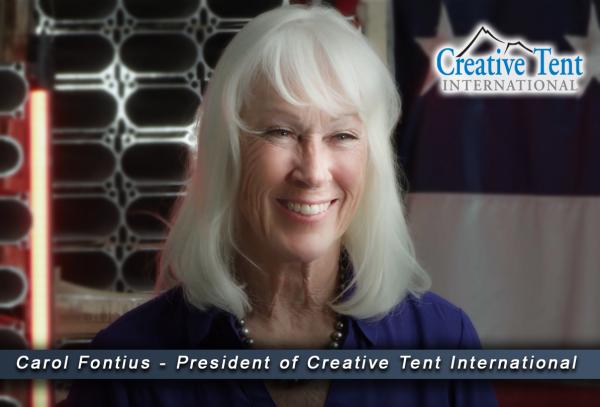
-- Carol Fontius is the President and Co-Founder of Creative Tent International, Inc. (CTI), a modular, semi-permanent fabric structure company based out of Southern Nevada. Raised in Siskiyou County, California, on the Oregon border, Carol grew up on a small ranch where her father made hay and raised cows. Both of her parents were schoolteachers, as well as three of her grandparents. Coming from a family of educators, Carol was always taught to take action. She was always encouraged to do things and to be physical. She was told “If you wanted something, do it. Figure out what to do and make it happen.”
At an early age, both Carol and her brother decided teaching would not be the career for them. With two small children, Carol accepted a position at the Employment Development Department of California. She was very surprised to be an “unemployment lady,” but she enjoyed the work she did. “It was a good job in a little community,” she describes. Unfortunately, when field offices closed, Carol once again found herself searching for employment.
She thought about what it was she wanted to spend her time doing, and decided it would be fun to own her own business – but what would she focus on? Around 1990, Carol met Robert (Bob) Stafford who designed and engineered structural tent products. She was intrigued by the interesting places he traveled to and wanted to learn more about what he did.
Soon after they formed a sales company. While Bob licensed his products to a manufacturing company, Carol bought and resold tents, particularly to the military. When their go-to manufacturing company closed, they had a problem to contend with. How would they continue the business? With Carol’s background, she knew exactly what to do. She did what she was always raised to do – Do It Yourself. They had the customer base, the trademark licenses, and the knowledge to make a great product. Within a week, they decided to open their own manufacturing company.
Carol remembers how difficult it was. She says they started “with very few dollars and had to make every penny count.” They had to find a facility and purchase the equipment to manufacture the product. The facility was small, and it was tough to train new people how to use the equipment. She says it was “quite a challenge.” But there was another challenge for Carol around the corner.
Carol has always been dedicated to supporting the US Military and its veterans. When starting CTI, she made it her focus to service as many branches as possible. As a woman in a male-dominated industry, Carol was not bothered by her colleagues. She was used to being in male-dominant situations and was very used to being supported by the men in her life. She knew there were ways to work with people and that she would learn how to do it. She says it’s “the hard work that matters.”
Working with the US Military was easier than being received in a male-dominated business. She recalls that often when she would speak out during meetings, people would often look to Bob to confirm her words. Many times, she would say something but it was not really heard. Then it would be presented by a man in the group as his own idea. She says that was very typical of the dynamic of men and women in the workplace. As a grown woman, Carol has come to the conclusion that men and women just communicate differently.
When asked how she confronted this issue, she said “first, you have to realize that it is real. This sort of behavior really does happen, and that you can’t change the whole culture between men and women by yourself.” She recognizes that it is important not to become frustrated or lose your temper. She says “don’t be angry. This is the way of the world and [she] had to learn to get through it.” Carol felt that she couldn’t change the people she was dealing with, except over time. By developing a relationship over a period of time, she began to be heard. She said, simply put, “some people are willing, and some aren’t.”
Her advice for young women entering the workforce is not to have a lot of preconceived ideas. If you want something, learn about it, go after it, and talk to people – ALL kinds of people. All kinds of people may have that tidbit you are looking for; “even if you don’t like them, they might have the information you need.” She recommends to “just be open and willing to push through the hard places.” And definitely, don’t take it personally. She says taking something personal is a “cycle that will take you down real fast. Just keep working at it and keep your goal in mind.” She emphasizes the importance of trying to understand people’s perspective and helping them understand yours.
Even though there are many things Carol says she would have done differently, she believes in one key element: Trust. “Trust the people you hire.” She says “you have to realize you cannot do everything by yourself,” which is one of the hardest parts for her. She loves learning about the people that work for her and their unique qualities. “There’s always something that they can help you with, and that you can help them with too. It’s one big team.”
Her goal for the future is to keep her company successful. She feels like it’s her baby and that she truly believes in it. She says “everything since the beginning of time has been happening in a tent; what is it you want to do? We can help you do it. Anything.”
Creative Tent International Inc. (CTI) is a proud ISO certified, American manufacturer. They design, engineer, manufacture, sell and maintain superior, high tension fabric, semi-permanent, clear-span structures.
Learn more about Creative Tent International https://creativetent.us/
Release ID: 89002111

